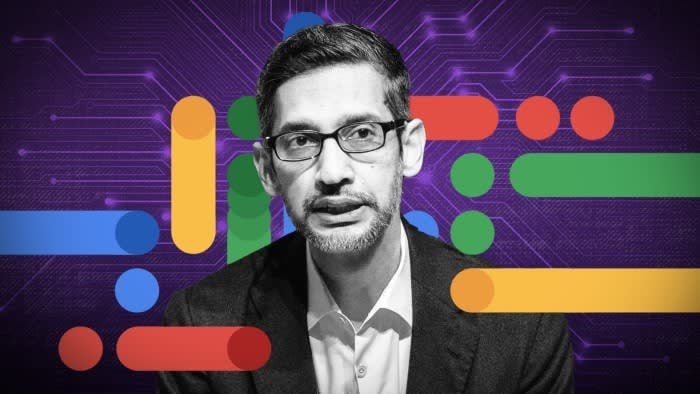How Google lost ground in the AI race

The Silicon Valley group has stumbled in the rollout of generative AI. Insiders say cultural and organisational issues are to blame
Thank you for reading this post, don’t forget to subscribe!
Madhumita Murgia in London and Richard Waters in San Francisco
In early 2023, months after the launch of OpenAI’s groundbreaking ChatGPT, Google was gearing up to launch its competitor to the model that underpinned the chatbot.
The search group had been testing generative AI software internally for several months by then. But as the company rallied its resources, multiple competing models emerged from different divisions within Google, vying for internal attention.
None was considered good enough to launch as the singular competitor to OpenAI’s model, known as GPT-4. The company was forced to postpone its plans while it tried to sort through the scramble of research projects. Meanwhile, it pushed out a chatbot, Bard, that was widely viewed to be far less sophisticated than ChatGPT.
When Google’s finished product, Gemini, was finally ready nearly a year later, it came with flaws in image generation that CEO Sundar Pichai called “completely unacceptable” — a let-down for what was meant to be a demonstration of Google’s lead in a key new technology.
The delayed release of Gemini and its mixed reception by users have been symptomatic of the Silicon Valley giant’s fumbled efforts over the past year to seize the lead in the use of generative AI — a technology that, by general agreement, Google played a central role in creating.
With its pioneering search engine, Google was in the vanguard of the internet revolution of the late 1990s and early 2000s, eventually branching out into email, mapping and more on its way to briefly becoming the world’s most valuable company in 2016.
But with AI chatbots like ChatGPT promising one of the biggest changes to how people navigate the world of online information since Google’s launch over 25 years ago, the company is in danger of losing its dominant position.
While Google has stumbled, arch-rival Microsoft has moved deftly. The software company made an early bet on ChatGPT-maker OpenAI and quickly embedded its AI-powered CoPilot service into most of its main software products. It is currently the world’s most valuable company.
There are signs that Google is ready for a more concerted response. Despite the glitches at its launch, Gemini ended up being well received in tech circles as a worthy rival to OpenAI’s latest technology and as a much-needed, unified platform on which Google’s various services can draw.
This week, meanwhile, the FT reported that the company was working on adding a premium, paid-for “tier” of generative AI services to its search engine. Though subscription revenue would probably be dwarfed by the $175bn in advertising that search and related services brought in last year, the idea would still be a radical departure for a company whose core business has relied exclusively on advertising.
Yet Google is still struggling to make a success out of generative AI. Company insiders say big-company inertia, a fragmented organisational structure and the lack of a single, coherent company-wide plan for rolling out generative AI across its range of products and services has hampered efforts to stamp its mark on the technology.
This account of how Google fell behind is based on multiple interviews with current and former executives, industry insiders and analysts.
Sundar Pichai, addresses a conference in California. Google’s CEO has conceded that the sudden popular interest in AI caught him by surprise © Paul Morris/Bloomberg
These people suggest the company’s efforts have been stymied by simmering tensions between rival factions, a lack of clear leadership and struggles to adapt from its position as the search market’s dominant incumbent. In particular, there has been escalating pressure on Pichai to be more aggressive in Google’s AI product launch and strategy.
“It’s a question of execution under pressure, which people in Silicon Valley refer to as wartime leadership,” says Rob Leathern, who worked on product privacy at Google until March 2023. “If you have your back to the wall and don’t have a history of operating from that perspective, you may not have those muscles readily available. There is a ton of pressure on senior leadership there.”
Pichai conceded this week that the sudden popular interest in AI — triggered by the global sensation caused by the 2022 launch of OpenAI’s ChatGPT — had caught him by surprise.
Speaking at an event at Stanford University, he claimed credit for recognising years ago how significant AI would be for all of Google’s products. But he said his company was “surprised” by the scale of popular engagement. “I had a different sense of the trajectory in mind.”
According to Pichai, the AI era has barely begun. “I feel incredibly well positioned for what is coming, and we are still in the very early days,” he said.
But Google’s initial response to ChatGPT has exposed weaknesses. Its first, hurried answer, Bard, failed to turn the tide. Google parent Alphabet lost $100bn in market value on a single day when the bot gave the wrong answer to a question during a demonstration.
A worker sits inside Google’s campus in Mountain View, California. Many Google workers express frustration at what they see as a lack of clear leadership at the company © Paul Morris/Bloomberg
Bard would eventually evolve into Gemini, which was launched in February. But Google was quickly forced to pause the generation of people by the bot’s image-generating tool, after it was found to produce depictions of women and people of colour in inaccurate contexts, for instance as Viking kings or German soldiers from the second world war.
Some Google insiders blame the bad publicity on the fact that, as the market leader in search, the company’s mistakes attract outsized attention. According to these people, this makes the company hesitant to move as quickly as others in adopting new AI services, while also subjecting it to disproportionate attention when things, inevitably, go wrong.
Yet cultural and organisational problems also loom large. Current and former Google executives described the company as a series of fiefdoms. Each product line has its own leader, with workers incentivised to make incremental changes to optimise products, rather than radically innovate or work across teams.
Decisions about how to implement generative AI have been spread between divisions responsible for its main search and information services; its computing platforms, including Android and the Chrome browser; cloud computing, which includes Gmail and productivity apps; and YouTube. Former employees describe the mood as one of watching an approaching iceberg but being unwilling or unable to change course.
There’s a dissonance between the AI teams trying to do new things and the search and ads teams “trying to preserve what they have”, says one person with knowledge of the company’s workings. “Google is a nation-state, and the company is run by bureaucrats.”
Elizabeth Reid, who was recently appointed head of search in a sign that Pichai is starting to look to a new generation of managers © David Paul Morris/Bloomberg
Pichai admits to challenges caused by Google’s sheer size. “Scale isn’t always good for you,” he said this week, since it makes it harder to “move fast [and] maintain a culture of risk-taking”. He added that “counter-intuitively . . . the more successful things are, the more risk-averse people become.”
In response, the Google CEO said he was consciously trying to “create capacity in the system where people can do new things”. In one example, he pointed to Google’s use of a test site called Google Labs for last year’s launch of an experimental new search service that included generative AI features — a throwback to the way Google used to do such things.
“We are trying to make it easier to put out something without always worrying about the full brand and weight of building a Google product,” he said.
However, many Google workers express frustration at what they see as a lack of clear leadership, particularly in the wake of recent rounds of lay-offs that have left staff rattled.
Google software engineer Diane Hirsh Theriault, who has worked for the company for eight years, wrote on LinkedIn in January, that leaders had “no real vision of their own” and were instead “trying to point in a vague direction (AI) while at the same time killing their golden goose”, in a reference to the recent job cuts.
A worker stands in Google’s Bay View campus in California. The company is working on adding a premium, paid-for ‘tier’ of generative AI services to its search engine © David Paul Morris/Bloomberg
Amid the unease, Pichai has stepped in to make many of the day-to-day decisions about how generative AI should show up in its products, according to people at the company. One staffer says Pichai has in effect become Google’s “chief product officer for AI”, similar to his role as the company’s product chief which he briefly held before becoming CEO in 2015.
Pichai is a widely-liked boss who prefers to manage by consensus, and some at the company are worried that his low-key leadership style may not be suited to a time when Google needs decisive change to close the AI gap with Microsoft and OpenAI.
One insider warned his close involvement in the details of AI products risked being a distraction from his broader duties as chief executive. Two sources described how senior stakeholders inside and outside the company are pressuring Pichai to be more radical and decisive.
In one big move in the aftermath of ChatGPT’s launch, Pichai pushed through a merging of its two AI research divisions: London-based DeepMind and California-based Google Brain, last April. DeepMind co-founder Sir Demis Hassabis was appointed the head of the combined group, named Google DeepMind, gaining a privileged position that has led to resentment among those who believe the product teams, and not researchers, should be steering the introduction of AI to the company’s services.
“People are feeling threatened,” says one former Google staffer. “There is [Google DeepMind] and there is everybody else.”
Even within the newly merged organisation, there are factions and divisions that curb entrepreneurialism, one current employee says. They referred specifically to a split between teams working on Gemini and those focused on more fundamental research, with the latter struggling to access compute and other coding resources necessary to scale up AI experiments, resulting in missed opportunities to innovate.
Despite internal rumours that there would be a similar reorganisation across Google, such as appointing a single product chief across all its services, Pichai continues to act in that role. There are signs of change, however. Longtime executive Elizabeth Reid, who worked on the generative AI search experience, was recently appointed head of search. This is the first time Google’s main product has been under the control of a single executive in four years, and a sign that Pichai is starting to look to a new generation of managers.
Overhanging Google’s adoption of generative AI is the disruptive threat the technology could pose to its core search business © Mike Kai Chen/Bloomberg
Still, Pichai’s incremental approach stands in contrast to Microsoft chief executive Satya Nadella, who has made a series of bold bets on AI, including investing about $13bn into an alliance with OpenAI, a smaller investment in French start-up Mistral and rolling out AI in Microsoft products widely.
Overhanging Google’s adoption of generative AI, meanwhile, is the disruptive threat the technology could pose to its core search business.
If AI makes it possible to give search users direct answers to more of their questions, it could reduce the need to click on the links and adverts that Google displays. This problem helps explain why Pichai has been cautious in adopting big changes to its search engine, analysts and challengers say.
“They need to figure out how to cannibalise their own cash cow and face Wall Street, message it in the right way, and handle short-term fluctuations in the stock,” says Arvind Srinivas, a former Google intern who is now chief executive of Perplexity, an AI-powered search app. “It’s not that Google doesn’t know how to do these things. But rather, it is risky for them to do anything.”
Google insiders say the company’s advertising business has come through similar upheavals before, most notably with the arrival of smartphones. But it took years to prove to advertisers and investors that mobile advertising would be as effective and profitable as its existing business.
Pichai, meanwhile, holds that people who worry about disruption from AI are falling for “one of the common myths” about Google and missing an important point about its history. The company has been providing direct answers to some questions for years, he said.
Google workers attend an event to mark the rollout of Bard, which evolved into Gemini. The company was forced to pause the generation of people by the bot’s image-generating tool after it was found to produce depictions of women and people of colour in inaccurate contexts © David Paul Morris/Bloomberg
Google first faced claims that it might undermine its own web search service when it started to return direct answers with its Google Instant service 14 years ago. Since then, the number of situations in which Google delivers direct answers has steadily increased — something made all the more important, according to Pichai, by the wider use of smartphones, where clicking through search results is more cumbersome.
Despite that, says Pichai, users have continued to click on Google’s links. “All that is different now is the technology by which you can answer is progressing.”
Critics, however, say this underestimates the scale of the disruption that generative AI could bring. Google has not disclosed the results of the AI-powered search experiment it has been running since last May, though Pichai claimed in January that it was providing even more links than on traditional Google search results.
The company has also started the first, limited tests of some generative AI features in its main search engine, showing AI-powered overviews of a small number of topics to some users the US and UK.
For now, some of the immediate pressure on the company to rush into delivering AI-generated search results may have eased. Microsoft’s share of internet search traffic has edged up since it stole a march on Google a year ago by adding AI-powered elements to its own search engine, Bing. But at only 4.4 per cent, according to Statcounter, its share of the global search market hardly represents a threat yet to Google, which has 89.5 per cent.
But the longer it takes to wholeheartedly adopt generative AI, the greater the risk that internet users will turn to rival chatbots or other AI-powered services.
“I would still say, given everything they have, it would be hard to bet against them just yet,” Leathern says. But, he adds, “the belief is they can be doing better and leading in this area.”
Additional reporting by Stephen Morris and George Hammond in San Francisco





